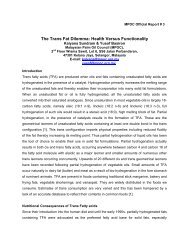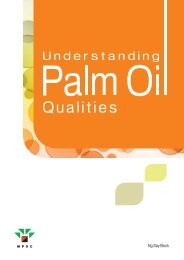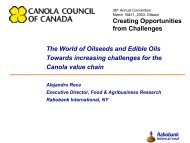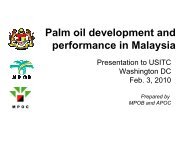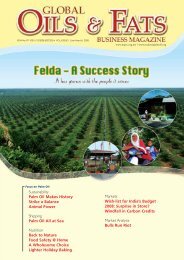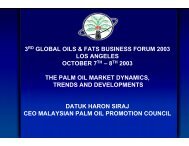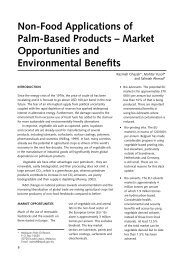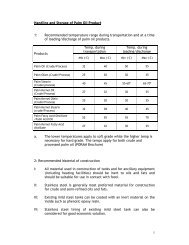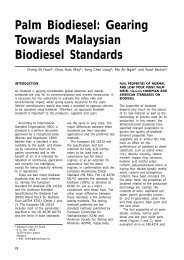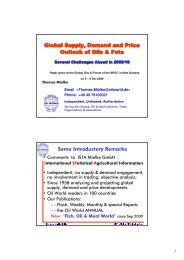Create successful ePaper yourself
Turn your PDF publications into a flip-book with our unique Google optimized e-Paper software.
South Korea has no domestic oil reserves,<br />
and is the world’s seventh-largest<br />
consumer and fifth-largest importer of<br />
crude oil. B5 bio-diesel (a 5% blend for<br />
private vehicles), went on sale in July. As<br />
the government gives tax waivers for use<br />
of clean fuel, bio-diesel is about 7 won<br />
(korean currency) lower per litre against<br />
regular diesel. B20 bio-diesel (20% biodiesel:<br />
80% mineral diesel) is being<br />
considered for future use.<br />
Japan, the world’s fourth-largest energy<br />
consumer, remains highly dependent on<br />
oil imports. The 2002 Law Concerning<br />
Special Measures for Promotion of the<br />
Use of New Energy requires all electric<br />
power utilities to supply 1.35% of total<br />
electricity from renewable sources by<br />
2010. The government has also set a<br />
target of 3% of total energy consumption<br />
from new sources by the same year.<br />
But availability and stability of supply are<br />
a major problem in developing a bio-fuel<br />
market. In May 2005, Japan signed a<br />
US$578 million loan agreement with<br />
Brazil to finance infrastructure, which will<br />
result in increased bio-fuels exports to<br />
Japan. The Japanese government had<br />
aimed to introduce automobile fuel<br />
containing 3% bio-ethanol in the market<br />
in 2005, but the plan failed because of<br />
inadequate supply.<br />
In China, the Renewable Energy Law,<br />
endorsed in February 2005, raised the<br />
target from the present level of 3% of<br />
renewable energy to 10% by 2020.<br />
This is equivalent to one-third of Malaysia’s<br />
current CPO inventories, which suggests that<br />
the perceived large quantity would very quickly<br />
be absorbed. Interestingly, the 1.6 million tonne<br />
inventory set against today’s global use is<br />
equivalent to only 17 days of consumption.<br />
Exports to Asia<br />
Due to logistical reasons, the bio-diesel<br />
market is expected to be quite fragmented -<br />
soybean-based bio-diesel or corn-based bioethanol<br />
is likely to be utilised in the Americas;<br />
rapeseed-based bio-diesel will be dominant in<br />
the EU; and palm-based bio-diesel in Asia.<br />
Asian countries like Japan, Singapore,<br />
Korea, China and India are signatories to the<br />
Kyoto Protocol. Some governments have<br />
announced their bio-fuel policies, which<br />
should be positive for CPO in the medium and<br />
long term, as this will soak up more inventories.<br />
The Indian government has foreshadowed<br />
the mandate of B20 by 2011, but is likely<br />
to focus on jatropha oil (an inedible crop<br />
that can grow in arid areas) to supply biodiesel.<br />
Not yet commercially planted<br />
anywhere, it also has a low yield.<br />
In Singapore, the Kyoto Protocol came<br />
into force in July after it formally<br />
submitted its acceptance of the agreement<br />
on April 12, 2006.<br />
<strong>Palm</strong>-based bio-diesel is the most logical<br />
choice for Asia as it is the cheapest vegetable<br />
oil and, therefore, the lowest priced<br />
feedstock. The yield is about 5-6 tonnes per<br />
ha (the highest among the oil crops) and<br />
therefore, supply is readily available.<br />
Tan Ting Min<br />
Analyst, CSFB<br />
The views expressed are those of the writer.<br />
GLOBAL OILS & FATS BUSINESS MAGAZINE •VOL.3 ISSUE 3, 2006 9



